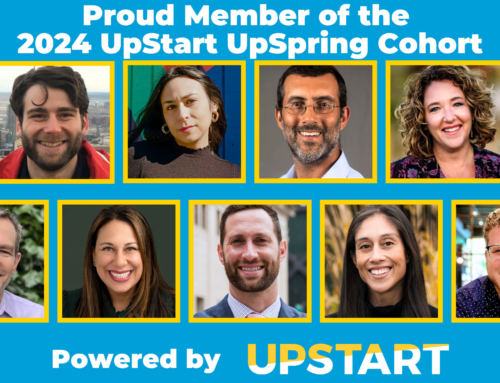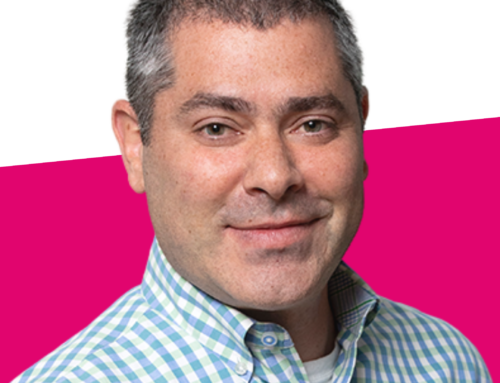Republished from eJewishPhilanthropy by UpStart CEO, Aaron Katler
Since Oct. 7, Jewish social impact organizations have faced a perfect storm: skyrocketing demand for their programs and services, paired with a rapidly shifting philanthropic landscape. As the sector grapples with donor fatigue and evolving funding priorities, many organizations are left navigating financial uncertainty while trying to meet urgent community needs.
At UpStart, we recognized this challenge and responded with an experiment in nimble philanthropy: the Rapid Expert Engagement Grants (REEG). These $5,000 grants were designed to provide fast, flexible funding for ventures experiencing financial distress, enabling them to engage expert consultants to strengthen their business models, fundraising strategies and donor communications. The results? A powerful demonstration that small, targeted grants can drive transformative impact.
Leading with innovation and an entrepreneurial mindset
Innovation doesn’t always mean starting something brand new. Sometimes, it’s about applying an entrepreneurial mindset to problem-solving — being agile and responsive and making smart, strategic bets.
That’s what we did with REEG: We looked at the challenges facing Jewish social entrepreneurs and asked, how can we get funding into their hands faster? How can we ensure they have access to the right expertise, at the right time, with minimal friction? In just a few months, 26 organizations received REEG funding, with a total investment of $130,000.
And these grants didn’t just provide a temporary financial boost; rather, they catalyzed long-term strategic improvements.
One organization restructured its fundraising approach, resulting in a 20% increase in year-end revenue and the acquisition of five high-net-worth donors. “This is a new kind of campaign for us,” shared a development leader at the organization. “The consultant we hired helped us in two ways: first, by giving us the confidence to act upon information we thought was actionable but weren’t sure, and second, by offering critical insights into our solicitation strategy and donor gift structure.”
Another grantee leveraged its grant to refine a major donor campaign tied to its CEO transition, raising its projected fundraising goal from $1.5 million to $2.5 million. Others used their funding to integrate donor management tools like Salesforce and iWave, dramatically improving their ability to track and engage donors.
For some, the REEG grant made it possible to launch a strategic planning process that unlocked additional funding opportunities. One organization, for example, was able to work with a PhD ethnographer established in the Jewish community to build its first-ever strategic plan. “This process has really pushed me to see beyond the challenges and limitations of growing a startup organization into the mezzanine phase,” the organization’s leader reflected.
Another grantee emphasized the power of receiving fast, unrestricted support at a critical moment: “We would not have been able to have any of these critical resources if it were not for the accessible and quick funding from the REEG.”
A shared responsibility for the Jewish future
This work isn’t just about what UpStart is doing — it’s about all of us. Philanthropists, social entrepreneurs and ecosystem builders need to work together to strengthen Jewish life. The challenges we face are too big for any one organization to solve alone, but when we collaborate, we can drive real change.
The REEG initiative was a reflection of this collective effort. We created a simple, 10-minute application. We guaranteed that every eligible organization received funding. And we got the money out the door within two to three weeks. Because when the need is urgent, internal processes should not stand in the way of impact.
The REEG initiative underscores a larger shift worth considering: small, unrestricted grants can be game-changers. While major, multi-year gifts remain essential, there is immense value in deploying smaller amounts of capital quickly, with minimal obstacles, to enable organizations to adapt, experiment, and build foresight.
As we look ahead, there are several key takeaways:
1. Small grants create big impacts. Modest investments can unlock significant growth and sustainability when targeted strategically.
2. Capacity building is essential. Funding for fundraising, infrastructure, and staff development is just as critical as programmatic support.
3. Strategic flexibility is key. Organizations need room to pivot and respond to changing realities, and funders should empower them to do so.
4. Fast funding is effective funding. Grant processes should match the urgency of the challenges organizations face.
5. Collaboration amplifies learning. Convening grantees to share insights can strengthen the broader ecosystem.
The challenges facing the Jewish community today demand bold solutions. Sometimes, all it takes is $5,000 at the right time to change the trajectory of an organization — and ultimately, an entire community.
The REEG initiative is just one example of how we can rethink philanthropy to better serve Jewish social entrepreneurs. If we’re going to seize this moment, we collectively need to move faster, think bigger and support the leaders who are shaping the Jewish future.
Aaron Katler is the CEO of UpStart. He previously served as the director of special projects and senior philanthropic advisor at the Jewish Community Federation of San Francisco and as chief field officer at BBYO. He also founded Endangered Spirit, an environmental education tourism company operating across the Americas.
Our purpose is to enable entrepreneurs to bring bold Jewish ideas to light. We help them reach Up to people in new ways that are meaningful, more inclusive, and create a brighter future for our Jewish community and the world we share.




